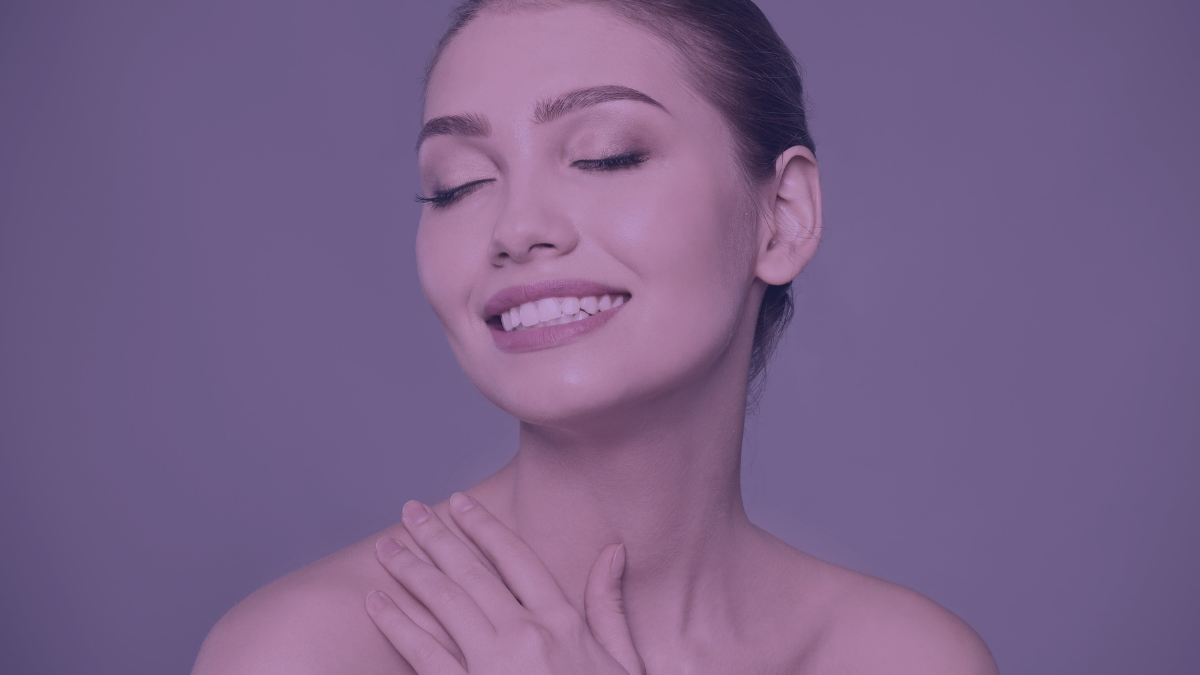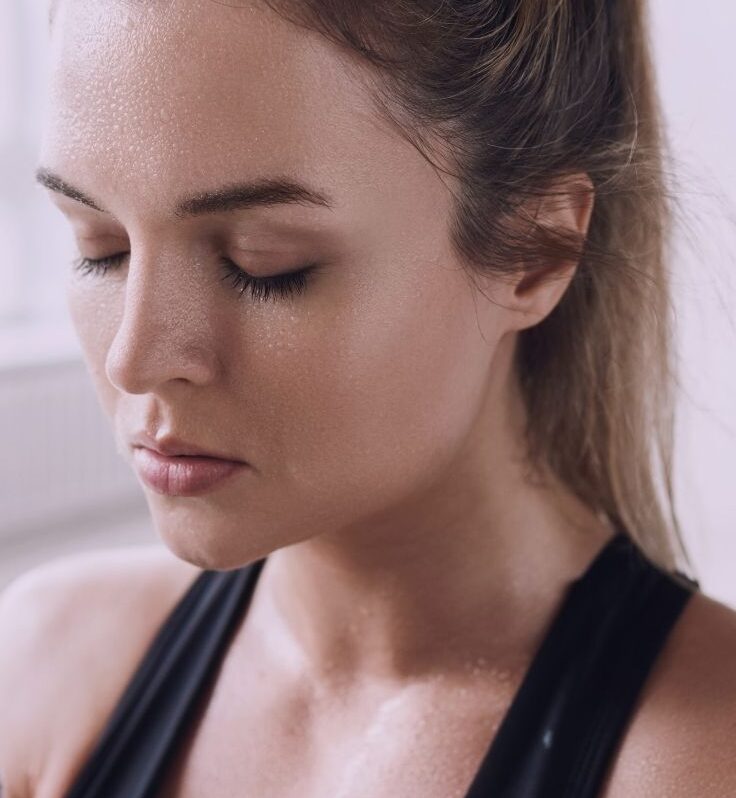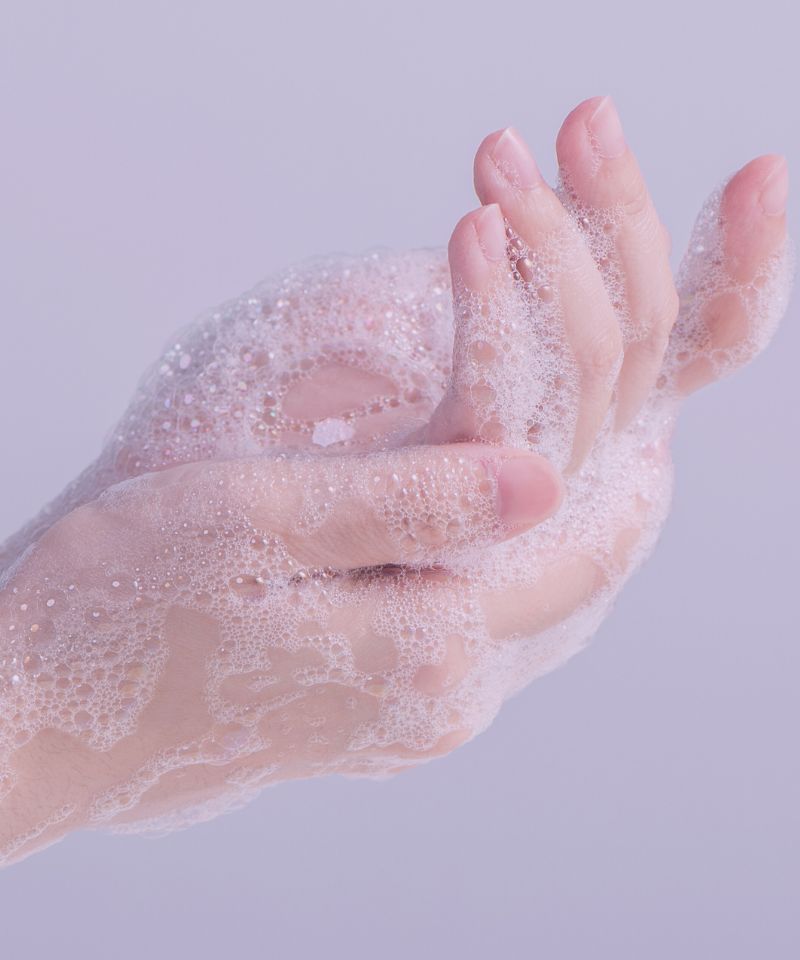While acne is not necessarily a hygiene-related skin condition, poor hygiene practices can be one of the many causing factors and may also exacerbate the appearance and severity of existing acne.
Similarly, while acne is primarily the result of bacterial overgrowth inside the pores, certain face hygiene tips can help limit the spread of this harmful pathogen, reduce active breakouts, and prevent new ones from forming.
Here are ten simple skin hygiene tips and practices that will help you prevent acne (& keep your skin healthy):
- Wash your face properly.
- Wash your hair frequently.
- Shower right after a workout.
- Ditch the towel.
- Wash your hands thoroughly.
- Don’t touch your face.
- Clean your phone screen.
- Clean your headphones/headset.
- Change your pillowcase regularly.
- Clean your makeup brushes regularly.

#1 Wash Your Face Properly
Acne hygiene is important in preventing future breakouts, which is why removing oil, dirt, bacteria, pollution, and sweat accumulated on the skin’s surface throughout the day is essential.
An easy way to do this is by washing your face at least once ~ but preferably twice a day ~ with a gentle cleanser and lukewarm water.
Accumulated oil, sweat, pollution, bacteria, and dirt can create a layer on the skin’s surface that will prevent newly produced oil and skin cells from reaching it and cause the cellular debris to become stuck inside the pores, where it will serve as food, helping the acne-causing bacteria to grow.
Additionally, the sticky layer of debris on the skin’s surface can also trap more dirt and external bacteria, leading to more accumulation, inflammation, redness, and pus, which are the classic signs of acne.
Therefore, maintaining a proper face-washing routine with the right cleanser for your skin type will help keep your skin clean and free of unwanted visitors.
• Esthetician-approved! Here are the best anti-acne facewashes to get!
#2 Wash Your Hair Frequently
Your hair can also be a source of breakouts, especially around the hairline, cheeks, and forehead, especially if you wear certain hairstyles, such as bangs.
Acne triggered by hair usually occurs while sleeping, when the hair’s oils, dirt, and sweat rub against the skin throughout the night.
Therefore, washing your hair regularly with a gentle shampoo is important to help reduce the buildup of dirt, oil, and sweat and prevent these components from transferring onto your skin and causing acne.
#3 Shower Right After a Workout

Sweating it out at the gym or engaging in any form of intense physical activity significantly increases perspiration levels.
While sweat in itself isn’t acne-causing, it creates an ideal environment for acne-causing bacteria to flourish if allowed to sit on the skin for long periods.
Post-workout, your body is likely coated in a mix of sweat, oil, and various impurities in the air, such as dead skin cells, bacteria, and dust particles.
If not promptly cleaned away, these elements accumulate on the skin’s surface and can cause clogging, which leads to breakouts.
Therefore, showering right after a workout or as soon as possible will wash away these impurities, making them less likely to trigger acne.
#4 Ditch the Towel
While grabbing a towel to pat our face dry after washing is something we do mechanically without even thinking about, this practice might be detrimental to your skin health.
Rubbing a wet or used towel on your face is definitely a bad idea if you’re dealing with acne, as wet towels are a breeding ground for bacteria, an organism that thrives in damp places.
By transferring some of that bacteria onto your skin, you are increasing your chances of experiencing skin infections and breakouts that can take days, weeks, or even months to heal.
Additionally, towels can be pretty abrasive, and vigorously rubbing something with a rough surface on already inflamed skin will cause further inflammation, irritation, dryness, and discomfort.
To avoid this, ditch the towel and let your skin dry naturally.
It will only take a couple of minutes, so you won’t be wasting any precious time, but you will be assisting your skin in its healing process.
#5 Wash Your Hands Thoroughly

During the day, your hands come in contact with many surfaces that may be contaminated with all sorts of bacteria and dirt that will get transferred onto your skin whenever you touch your face with dirty hands.
This will increase your chances of experiencing skin and eye infections as well as inflammatory conditions such as acne.
To avoid these problems, it’s essential to take precautions. Always wash your hands thoroughly with soap and warm water.
This is especially important before touching your face.
Activities like removing makeup, cleansing your skin, and applying your skincare routine require the most contact with your face.
You want to ensure you’re not transferring potentially dangerous pathogens to your skin during these times.
#6 Don’t Touch Your Face
Besides during cleansing and applying your skincare routine, touching your face should be kept to a minimum.
This is because our hands, fingers, and under nails contain bacteria, dirt, and oils that we can easily transfer to our face by touching it, which will exacerbate inflammatory conditions such as acne while also increasing the risk of infections caused by various pathogens.
Therefore, be mindful of how often you touch your face and try to keep it to a minimum, as this practice will reduce the potential of infections, acne breakouts, and irritation.
Additionally, picking at your skin is also one of the leading causes of acne scars, as by popping your pimples, you will rupture the skin for the pus to come out, leaving an open wound behind that will heal poorly and leave a more prominent scar.
Therefore, if you want to avoid having to spend money on treatments that reduce the appearance of acne scarring, make sure to keep your fingers away from your skin.
#7 Clean Your Phone Screen

Your phone is a constant companion in your daily life.
You use it to text, call, check emails, browse social media, take photos, and more.
However, each time you touch your phone, you’re transferring dirt, oil, and bacteria from your hands to the screen.
When you hold your phone against your face to make a call, these impurities can easily transfer to your skin, potentially triggering acne breakouts.
Therefore, cleaning your phone screen regularly is crucial in the fight against acne.
To do this effectively, try using a microfiber cloth or alcohol-based disinfectant wipes to kill bacteria for a deeper clean.
Consistently keeping your phone clean can help prevent the transfer of acne-causing bacteria to your skin, reducing the likelihood of breakouts.
#8 Clean Your Headphones/Headset
Just like your phone, headphones and headsets are another tech accessory that comes into regular contact with your skin and hair.
Over time, they can accumulate dirt, oil, sweat, and bacteria, which can subsequently transfer to your skin, contributing to acne formation, particularly along your cheeks, jaw, ears, and hairline.
To prevent this, make sure to clean your headphones or headset once a day or at least a few times a week with antibacterial wipes or a mild disinfectant that can remove dirt and bacteria without damaging the device.
#9 Change Your Pillowcase Regularly

You spend hours every night with your face against your pillowcase, transferring oils and dead skin cells from your skin and hair onto the fabric and back to your skin.
Over time, the accumulated buildup on your pillowcase can get on your skin, clogging your pores and leading to breakouts.
To prevent this, it’s crucial to change your pillowcase regularly.
Ideally, switch it out for a clean one every two to three days, or if this isn’t an option, aim for once a week.
Additionally, choose pillowcases made from breathable fabrics like silk or bamboo, which are gentle on the skin and less likely to cause friction and irritation.
By keeping your sleeping surface clean, you can significantly reduce your chances of waking up to new acne.
#10 Clean Your Makeup Brushes Regularly
Makeup brushes can easily become a breeding ground for bacteria and fungi if not cleaned regularly.
These harmful microorganisms, along with accumulated makeup residue and oxidized oil, can get transferred back onto your skin and pushed deeper into the pores as you apply makeup, leading to clogging and acne breakouts.
Therefore, it is crucial to develop a routine of regularly cleaning your makeup brushes.
Aim to wash them once a week using a specialized brush cleaner or facial cleanser.
Regularly cleaning your makeup brushes not only minimizes the risk of acne but also helps your makeup application look more flawless and prolongs the lifespan of your tools.
PS: Here are some more articles related to personal hygiene and acne you may want to read next:

My name is Simone and I am a certified skin specialist. I created this website to teach my readers how to take great care of their skin and I also like to occasionally share my honest opinions on skincare products I’ve tried. You can learn more about me here.
